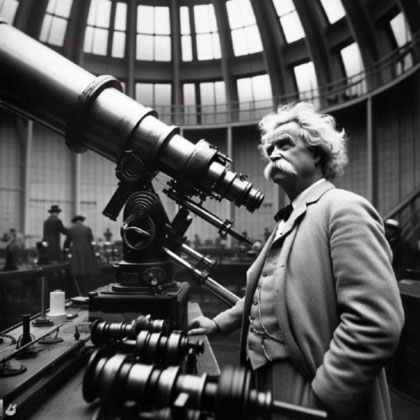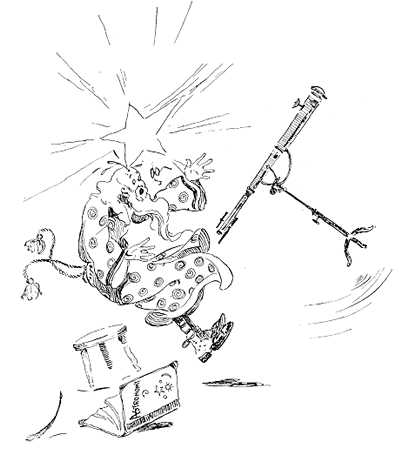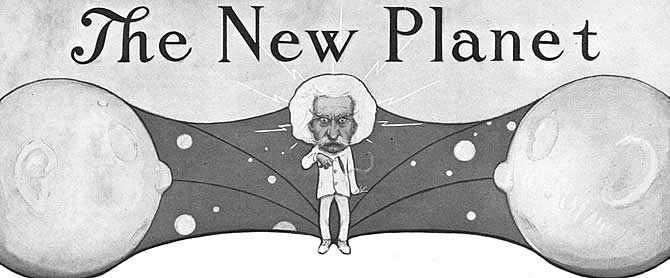

|
I do not see how astronomers can help feeling exquisitely
insignificant, for every new page of the Book of the Heavens they open
reveals to them more and more that the world we are so proud of is to
the universe of careening globes as is one mosquito to the winged and
hoofed flocks and herds that darken the air and populate the plains and
forests of all the earth. If you killed the mosquito would it be missed?
Verily, What is Man, that he should be considered of God? |
 AI image created by R. Kent Rasmussen |
|
I love to revel in philosophical matters--especially
astronomy. I study astronomy more than any other foolishness there is.
I am a perfect slave to it. I am at it all the time. I have got more smoked
glass than clothes. I am as familiar with the stars as the comets are.
I know all the facts and figures and I have all the knowledge there is
concerning them. I yelp astronomy like a sun-dog, and paw the constellations
like Ursa Major."
- Letter from Mark Twain, San Francisco Alta Calfornia, Aug. 1, 1869 |
Mark Twain and Halley's Comet from the Dave Thomson collection |
 Illustration by "Dwig" from BREVITIES, 1903 |
Spectrum analysis enabled the astronomer
to tell when a star was advancing head on, and when it was going the other
way. This was regarded as very precious. Why the astronomer wanted to know,
is not stated; nor what he could sell out for, when he did know. An astronomer's
notions about preciousness were loose. They were not much regarded by practical
men, and seldom excited a broker. - "The Secret History of Eddypus" |
|
An occultation of Venus is not half so difficult as an eclipse of the
sun, but because it comes seldom the world thinks it's a grand thing. If I were going to construct a God I would furnish Him with some ways
and qualities and characteristics which the Present (Bible) One lacks.....He
would spend some of His eternities in trying to forgive Himself for making
man unhappy when He could have made him happy with the same effort and
He would spend the rest of them in studying astronomy. Constellations have always been troublesome things to name. If you give
one of them a fanciful name, it will always refuse to live up to it; it
will always persist in not resembling the thing it has been named for. For three hundred years now, the Christian astronomer has known that
his Diety didn't make the stars in those tremendous six days; but the
Christian astronomer doesn't enlarge upon that detail. Neither does the
priest. Every star, unless it has a family of planets, floats in an immeasurable
solitude like a mustard seed in mid-Atlantic. General space -- that sea of ether which has no shores, and stretches
on, and on, and arrives nowhere; which is a waste of black gloom and thick
darkness through which you may rush forever at thought-speed, encountering
at weary long intervals spirit-cheering archipelagoes of suns which rise
sparkling far in front of you, and swiftly grow and swell, and burst into
blinding glories of light, apparently measureless in extent, but you plung
through and in a moment they are far behind, a twinkling archipelago again,
and in another moment they are blotted out in darkness; constellations,
these? yes; and the earliest of them the property of your own solar system;
the rest of that unending flight is through solar systems not known to
men. There isn't any Neptune that can outperturbate a dog; and I know, because
I am not speaking from hearsay. Why, if there was a planet two hundred
fifty thousand "light-years" the other side of Neptune's orbit,
Professor Pickering would discover it in a minute if it could perturbate
equal to a dog. Give me a dog every time, when it comes to perturbating. |

Illustration
from HARPER'S WEEKLY, January 30, 1909
from the Dave Thomson collection.
Quotations | Newspaper Articles | Special Features | Links | Search